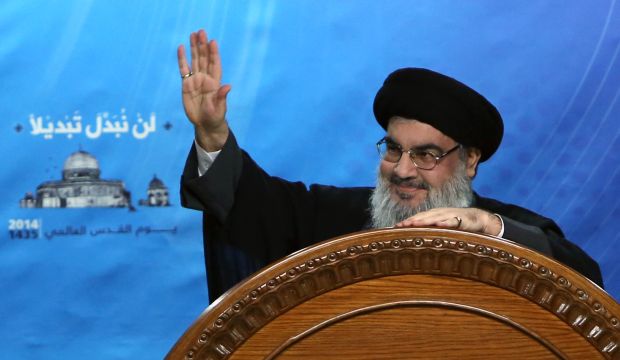The issue is not Hassan Nasrallah appearing on TV and reiterating his insults and verbal attacks towards Saudi Arabia and the Gulf States—this is nothing new for the Hezbollah chief, particularly since the launch of Operation Decisive Storm two weeks ago. Rather, the issue is Lebanese state television participating in this campaign of insults and attacks in an unprecedented manner.
In addition to airing Nasrallah’s insulting comments, Lebanese state TV also aired Nasrallah’s interview with Syrian state television. In response to all this, Lebanon’s Information Minister offered a limp apology in passing, promising to launch an “internal investigation” into the matter. This means that the official response of Lebanon, so far, has been nothing more than an off the cuff comment, with the government taking no action to address the negative impact Nasrallah’s remarks will have on Saudi-Lebanese ties.
In all countries of the world, opinions expressed on state television, without doubt, reflect and represent the government’s political orientation. It is true that mistakes can happen, and those who work in the media knows this well, but this argument is not viable when we are talking about a figure such as Nasrallah. Lebanese state TV aired remarks by a man who has been one of the staunchest defenders of the Iranian regime and who has only stepped up his anti-Saudi campaign since the start of Operation Decisive Storm. Nasrallah’s interview was aired in full, as if he were Iran’s Information Minister or an official spokesman, while no Lebanese official stepped in to stop this. This is indicative of some political, not media, message being sent by the Lebanese government to Saudi Arabia.
It is unacceptable for Lebanese state television to demonstrate this kind of bias, placing Iran’s interests above those of the Lebanese state. Aside from the information minister’s apology, which aimed only to deceive Saudi Arabia, the news director at the Lebanese broadcaster Saeb Diab said that national television is “for all Lebanon and is committed to observing objectivity and balance across the Lebanese spectrum.” But can this apply to footage and news taken directly from Syrian state television? When put with this question, Diab asked in surprise: “Why would broadcasting Nasrallah’s interview be banned?”
So while the minister apologized and promised to carry out an “internal” investigation, the real television executives in Lebanon do not see any problem with this in the first place.
Saudi Arabia and the Gulf States have been subject to an organized smear campaign by Lebanese media on a daily basis, whether by TV channels, newspapers or news websites. That the campaign has even reached Lebanese state television is not surprising; this is not because Iran controls the organs of the state through its legitimate proxy Hezbollah, or that several “currents” previously known for their patriotic stances are no longer able to confront Iran’s growing influence; rather, it is unfortunately due to those who do not appreciate the political and economic stances of the Gulf and take them for granted.
“Lebanese Persians” are launching an unprecedented campaign against Saudi Arabia and the Gulf and despite their recently increasing numbers, their stances, orientations and antagonistic discourse is well-understood. As for the “Lebanese Arabs,” of all sects—Sunnis, Shi’ites, Christians or Druze—while they have not been infiltrated by Iran, their role has been diminishing. Unlike in the past, their voices are no longer loud enough to stop Iran’s growing influence in the heart of the Lebanese state. This is something that has been on the rise ever since Tehran succeeded in exporting its revolution to Lebanon.
